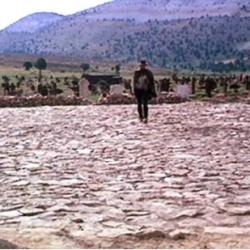Let's go back to our hypothetical old man sleeping in the doorway and to our non-hypthetical old man trapped in a submerged pickup truck. (Who is, police report, in stable condition.)
This is a free country. Each of us is free to see a stranger trapped or abandoned and to do nothing. We are free to put our own interests ahead of the interests of others. We are free to be selfish.
But that selfishness can, ultimately, erode our freedom. The more we choose to ignore and avoid the concerns of others, the more the state will be forced to attend to those concerns. A wholly selfish people can ultimately only be governed by a Leviathan state. A free people must also, therefore, be a good people.
But what do we mean by "good"?
Here I turn to W.V. Quine's delightful book Quiddities*. This is Quine on the subject of "Altruism":
Altruism is the main stem of morality and the primary concern of moral principles. The landlady says of her student lodgers that they are good boys, while knowing full well that they gamble, curse, drink, drive to endanger and consort with loose women. What does she mean? Just that they are reasonably altruistic.
Quine's landlady is, I think, a better judge of goodness than most of the virtuecrats and professional moralists who have made a career out of fretting about other people's immorality. She understands that vice, as we've come to define it, is no longer a true opposite of virtue.
The Bennetts, Borks and Bauers define virtue almost entirely as the avoidance of vice. And their conception of vice consists of a rather arbitrary list of no-nos. It is not possible, in their view, for the landlady's lodgers to be "good boys" if they also "gamble,** curse, drink, drive to endanger and consort with loose women." For these moralists, good people are, by definition, those who do not do these things.
Jesus' story of the Good Samaritan seems closer to the view of Quine's landlady than to that of the virtuecrats. The story begins with two members of the moral majority, a priest and a Levite, upright men who we can be sure abstained from gambling, cursing, drinking and consorting with loose women. They left a man bleeding by the side of the road.
My point here is not to defend the behavior of our rowdy student lodgers, but to point out that our national conversation about goodness and immorality is obsessed with trivia while ignoring matters of real importance. Janet Jackson is roundly condemned for having allowed one nipple a nanosecond of airtime during the Superbowl. Yet a man like Charles M. Cawley can build an empire based on usury and exploitation, amassing exorbitant personal wealth and power, and be hailed as a pillar of the community, "a larger-than-life visionary, a generous philanthropist."
Miss Jackson's immodest display of a pierced areola poses no real threat to the civic virtue than undergirds our freedom. MBNA's sociopathic disregard for the concerns of others does. We do not need more hyperventilating prudishness. We need more of Quine's altruism:
Altruism ranges from a passive respect for the interests of others to an active indulgence of their interests to the detriment of one's own. It ranges from the barely erogatory on the one hand to the supererogatory on the other. …
But [humanity's] altruism is not always as abundant as we could wish, nor are arguments from self-interest the way to increase it. The way rather is to play on whatever faint rudiments of fellow-feeling [we] may be capable of, fanning any little spark into a perceptible flame. Try the formative years for best results.
– – – – – – – – – – – –
* Quine's subtitle is "an intermittently philosophical dictionary." Don't let that fool you. It's nowhere near as dry as that sounds. Quiddities is a dictionary, Quine admits, only insofar as it's alphabetical arrangement liberates him from the need for a more formal structure. Reading it is a bit like sitting on a barstool next to a fascinating and opinionated polymath and prodding him to hold forth on a variety of semi-related topics.
** Insert your own William Bennett joke here.












